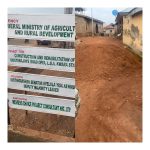Eniola Amodu
As President Bola Tinubu’s administration marks its first year in office, the spotlight intensifies on his government’s performance amid rising challenges and varying assessments from different quarters.
President Tinubu’s Determination
President Tinubu’s resolve to hold his ministers accountable underscores his commitment to delivering on his administration’s promises.
According to the Special Adviser on Information and Strategy, Bayo Onanuga, underperforming ministers face the risk of dismissal if they fail to meet the targets set for them.
Challenges and Achievements
The administration inherited a struggling economy characterized by soaring inflation, insecurity, and a fragile exchange rate.
Despite these hurdles, the government implemented bold policies such as the removal of the fuel subsidy and the unification of the exchange rate, aiming to steer the nation away from economic collapse.
Central to Tinubu’s vision is an eight-point agenda focusing on national security, the economy, agriculture, power, oil and gas, transportation, education, and healthcare. The aim is to foster inclusive growth, job creation, and societal well-being, especially for the youth.
To evaluate ministerial performances, Tinubu’s administration established the Central Delivery Coordination Unit (CDCU), tasked with tracking and assessing the implementation of key projects and initiatives. Additionally, a citizens’ feedback platform was launched to facilitate communication between the government and the populace, ensuring transparency and accountability.
While some government officials commend the administration’s achievements, including the removal of the petrol subsidy, critics argue that the economic policies have exacerbated hardship for ordinary citizens. The opposition People’s Democratic Party (PDP) and other analysts have labeled Tinubu’s first year in office as an “abysmal failure,” citing worsening economic conditions and unfulfilled promises.
Public sentiment reflects a mixture of disappointment and skepticism, with many expressing concerns about the government’s handling of the economy and its failure to address basic needs effectively.
Rising inflation, unemployment, and a general decline in living standards have fueled discontent among Nigerians.
Citizens’ Reactions
Meanwhile, citizens also expressed their opinions regarding the situation of the country under President Tinubu. On Twitter, users shared a range of perspectives:
@Dirawnn: “Na who go fire am too as an underperforming president bayi? Iranu oshi!” expressing frustration over the lack of accountability for the president.
@RITAENG1234: “Oga fire yourself and see how Nigerians go celebrate,” subtly criticizing the president’s performance.
@Tosinoyedapo1: “Please let him do exactly that,” supporting the president’s decision to fire underperforming ministers.
@follow_etiosa: “One year anniversary: Tinubu ready to fire underperforming ministers, says Presidency. Good luck with that! You might need to fire the entire cabinet… and the mirror, because let’s face it, the whole team has struck out. The country is struggling, citizens are suffering, and it’s time to take responsibility. Don’t just fire ministers, fire the incompetence!” expressing skepticism about the effectiveness of firing ministers alone and calling for broader accountability.













